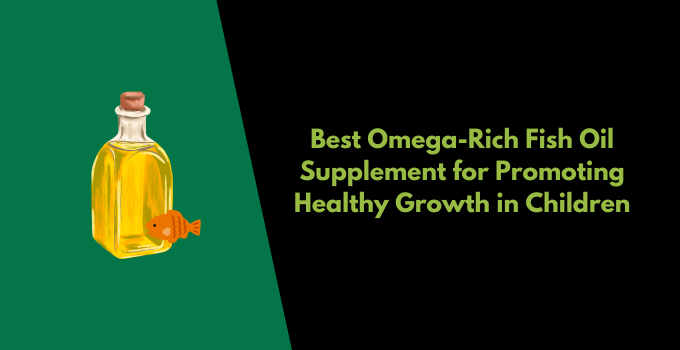For promoting healthy growth in children, an omega-3 rich fish oil supplement is vital, particularly those high in DHA and EPA. These fatty acids support brain development, cognitive function, and overall health. Recommended daily dosages vary by age: infants (0-12 months) need about 20-30 mg of DHA, toddlers (1-3 years) require around 700 mg of omega-3s, children (4-8 years) need 900 mg, and older children and teens require up to 1,600 mg for boys and 1,100 mg for girls. Top supplements include Nordic Naturals Children’s DHA, Bare Biology’s Action Heroes Omega-3, and Barlean’s Kid’s Omega Swirl, which are highly concentrated and certified for purity. You can incorporate these into your child’s diet by mixing them into foods like smoothies or yogurt. For more detailed guidance on benefits, dosages, and incorporation tips, continue to explore the extensive options available.
What Are Omega-3 Fatty Acids?
Omega-3 fatty acids are essential nutrients that play a pivotal role in your child’s growth and development.
These fatty acids, particularly EPA (eicosapentaenoic acid) and DHA (docosahexaenoic acid), are indispensable for brain function, heart health, and immune system support.
They’re integral to cognitive development, promoting better learning, memory, and brain health, while also helping to reduce symptoms of conditions like ADHD and asthma.
Why Omega-3 Fatty Acids is Important for Children?
Ensuring your child gets enough omega-3 fatty acids is essential for their healthy growth, development, and brain function.
Omega-3s, particularly DHA, are pivotal for fatty development and child growth, laying the groundwork for a smart start in life.
These fatty acids support the formation and function of the central nervous system, contributing to a healthy brain and enhanced brain power.
Omega-3s aid in the development of sensory, perceptual, cognitive, and motor neural systems, improving learning ability, reading, and maths skills.
They also promote better sleep quality and may reduce symptoms of ADHD and allergies.
Additionally, omega-3s can help reduce insulin resistance in obese children and lower the incidence of respiratory illnesses and diarrhoea.
Including omega-3 rich foods or supplements in your child’s diet can substantially benefit their overall health and cognitive development.
What Are the Nutritional Benefits of Fish Oil for Children?
Fish oil supplements rich in omega-3 fatty acids, particularly EPA and DHA, offer several critical nutritional benefits for children.
These supplements support brain development by enhancing learning, memory, and cognitive functions, as evidenced by studies showing improved verbal learning ability and memory in children who consume omega-3 rich foods.
Additionally, omega-3s contribute to immune system function, helping to reduce inflammation and promote overall health.
They also benefit eye health, supporting the development and function of the eyes, especially in infants and toddlers.
Furthermore, fish oil supplements have been linked to improvements in conditions such as ADHD, asthma, and mood disorders, with research indicating that omega-3s can help reduce symptoms of ADHD and improve mood and self-esteem in children.
How Does Fish Oil Support Brain Development?
When it comes to supporting brain development in children, fish oil supplements, rich in omega-3 fatty acids, play a pivotal role.
These supplements are essential for brain development, starting from fetal growth where DHA is indispensable for the formation and function of the brain and retina.
Omega-3s, particularly DHA and EPA, enhance cognitive function by supporting the development of neural connections and promoting synaptic plasticity.
This helps in improving learning, attention, and memory in children. Studies have shown that omega-3 supplements can improve verbal learning ability and memory, and even help in reducing symptoms of ADHD by enhancing brain processes.
Additionally, omega-3s support overall brain health, contributing to better sleep quality and improved school performance, making them a valuable supplement for children’s cognitive and neural development.
What Are the Benefits for Immune Function and Eye Health?
Omega-3 fatty acids in fish oil supplements provide significant benefits for both immune function and eye health in children.
These fatty acids, particularly EPA and DHA, act as an immune boost by reducing inflammation and supporting the overall health of the immune system. This inflammation reduction helps in maintaining healthy vision and offers eye protection by promoting visual acuity and preventing eye-related issues.
Fish oil supplements, such as those from Nordic Naturals and Carlson Labs, are rich in EPA and DHA, which are essential for healthy vision and immune function.
These supplements support the development of the eyes and brain, ensuring children have clear and healthy vision. By incorporating these omega-3 rich supplements into their diet, parents can help their children maintain robust immune systems and peak eye health.
Can Fish Oil Help with ADHD and Other Conditions?
Including omega-3 fatty acids, particularly those found in fish oil supplements, can have significant benefits for children struggling with Attention Deficit Hyperactivity Disorder (ADHD) and other conditions.
Fish oil, rich in omega-3s, is considered a valuable ADHD prevention strategy and alternative treatment. Studies show that omega-3 deficiencies are common in children with ADHD, and supplementing with fish oil can improve brain function, reducing symptoms of hyperactivity, inattention, and impulsivity[5].
Fish oil acts as a brain function booster by enhancing dopamine synthesis, a neurotransmitter vital for attention and impulse control.
It can also alleviate symptoms of asthma and promote better sleep quality in children.
Omega-3 supplements are generally safe, but it’s essential to avoid fish-based options if there are allergies, opting instead for vegetarian alternatives like algal oil.
What Are the Daily Recommended Dosages of Fish Oil for Children?
When considering the daily recommended dosages of fish oil for children, it’s vital to tailor the amounts based on their age and developmental stage.
For infants (0-12 months), the recommended daily intake is about 0.5 grams of ALA, though specific DHA and EPA guidelines are less defined and often integrated into overall omega-3 recommendations.
Children between 1-3 years, the daily need increases to around 0.7 grams of ALA, with studies suggesting 120-1,300 mg of combined DHA and EPA as beneficial.
Children aged 4-8 years should aim for about 0.9 grams of ALA, with similar DHA and EPA recommendations.
For older children and teens (9-18 years), the daily intake varies by gender, with girls needing around 1.0-1.1 grams of ALA and boys requiring 1.2-1.6 grams.
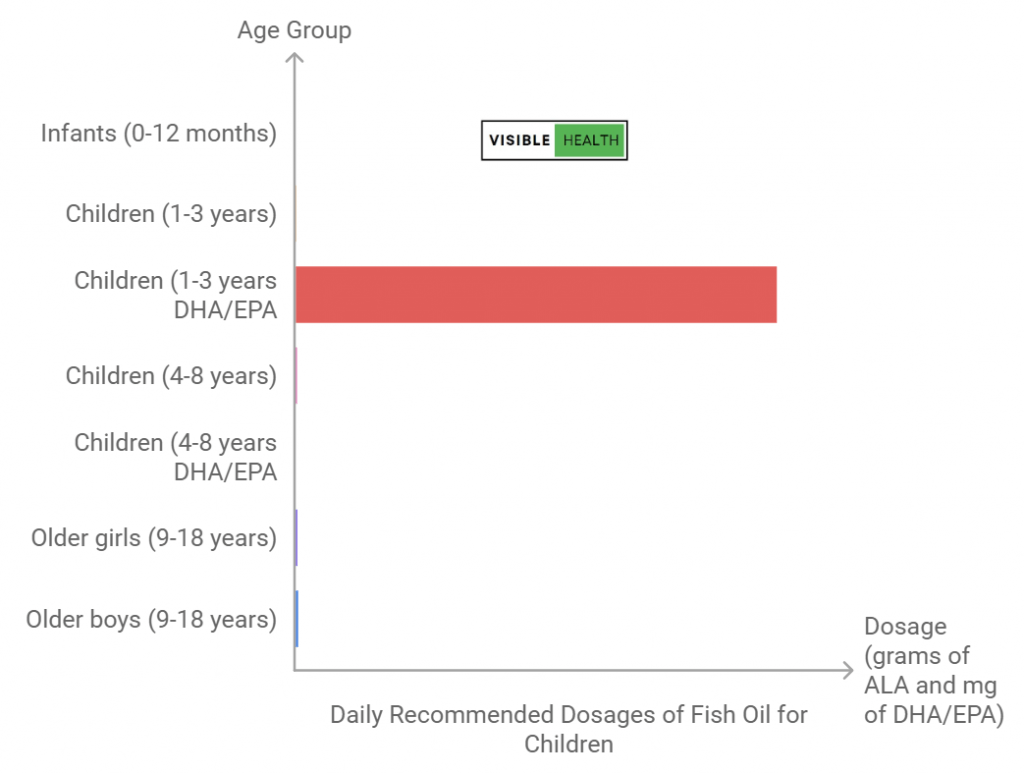
Dosages can be adjusted based on individual needs, such as health conditions or dietary deficiencies, and it’s advisable to consult a healthcare professional to verify proper dosage and to monitor any adverse effects.
What Are the Requirements for Infants (0-12 Months)?
For infants from 0 to 12 months, securing the right dose of fish oil is essential for their brain and body development.
During this period, omega-3 fatty acids, particularly DHA, are pivotal for infant nutrition, supporting healthy brain and retina development, as well as overall baby development.
The recommended daily intake for infants 0-12 months is approximately 0.5 grams of total omega-3s, which can be obtained through maternal health practices such as breastfeeding or formulated infant foods enriched with omega-3s.
Fish oil benefits include enhanced cognitive development and better vision health, making omega-rich foods and supplements a valuable addition to infant diets.
What Are the Requirements for Toddlers (1-3 Years)?
For toddlers aged 1-3 years, the focus is on supporting key toddler milestones, such as brain development, immune function, and overall childhood development.
International guidelines suggest that toddlers in this age group should receive around 433 mg of combined EPA and DHA daily.
Fish oil benefits include enhancing brain health, promoting better sleep, and improving symptoms of ADHD and asthma.
To verify your child gets these essential nutrients, incorporate fish oil into their healthy diets.
This can be done through liquid supplements, which are often flavored to make them more palatable for young children.
These supplements provide the necessary omega-3 fatty acids that are vital for healthy growth and development during this critical stage.
What Are the Requirements for Children (4-8 Years)?
As your child grows from the toddler stage to the age range of 4-8 years, their nutritional needs continue to evolve, and the daily recommended dosages of fish oil adjust accordingly.
For children in this age group, the developmental needs are significant, particularly with regard to brain development, immune function, and overall growth.
The age-specific nutrient requirements for children aged 4-8 years include approximately 900 mg of omega-3 fatty acids per day.
This aligns with dietary guidelines that emphasize the importance of DHA and EPA for healthy growth and development. Meeting these nutrient requirements is vital for supporting cognitive function, immune system health, and other growth factors.
Adhering to these guidelines helps guarantee your child’s dietary needs are met, promoting peak health and development during this critical period.
What Are the Requirements for Older Children and Teens (9-18 Years)?
For children aged 9-13 years, the recommended daily intake of omega-3 fatty acids is 1.0 gram for girls and 1.2 grams for boys, primarily in the form of ALA (alpha-linolenic acid).
For teens aged 14-18 years, the recommendations are 1.1 grams for girls and 1.6 grams for boys.
These omega-3s are essential for brain health, cognitive function, and overall development, and they can also enhance vitamin synergy, ensuring that other nutrients are effectively utilized by the body.
Including omega-3 rich foods or supplements in their diet can help meet these requirements, supporting healthy growth and development during these critical years.
How Can Dosages Be Adjusted Based on Individual Needs?
Adjusting the dosage of fish oil for children involves considering their age, health status, and specific nutritional needs.
For personalized dosing, it’s vital to evaluate individual needs through health assessments. Children’s daily recommended dosages of omega-3s, particularly EPA and DHA, vary by age.
For example, children aged 4-8 years should aim for around 600 mg of EPA and DHA combined, while those aged 9-18 years need about 1.0-1.6 grams of total omega-3s, depending on gender.
Customized supplements can help meet these requirements.
For instance, products like Carlson Kid’s The Very Finest Fish Oil and BrainMD’s Kids’ Omega-3 Squeeze offer specific dosage adjustments based on age groups, guaranteeing the right amount of omega-3s for healthy development, brain function, and heart health.
Dosage adjustments should be made under the guidance of a healthcare professional to guarantee the child’s unique needs are met without adverse effects.
Which Fish Oil Supplements Are Recommended for Kids?
When selecting a fish oil supplement for your child, several reputable options are available.
You might consider Nordic Naturals Children’s DHA, which offers a naturally balanced source of EPA and DHA in a liquid form with a pleasant orange flavor, supporting brain development and immune system function.
Another option is Bare Biology’s Action Heroes Omega-3 Fish Oil, a highly concentrated liquid supplement with 500mg of DHA per drop, certified for purity and freshness, and suitable for children from 6 months old.
Additionally, BrainMD’s Kids’ Omega-3 Squeeze is a sugar-free, lemonade-flavored liquid emulsion providing 675 mg of bioavailable EPA and DHA per serving, which can be easily mixed into various foods like smoothies or yogurt.
These supplements are designed to meet the nutritional needs of children while ensuring high quality and palatability.
1. Barlean’s Omega Kids Swirl Fish Oil Liquid Supplement
Barlean’s Omega Kids Swirl Lemonade is a top recommendation if you’re looking for a fish oil supplement that your kids will actually enjoy.
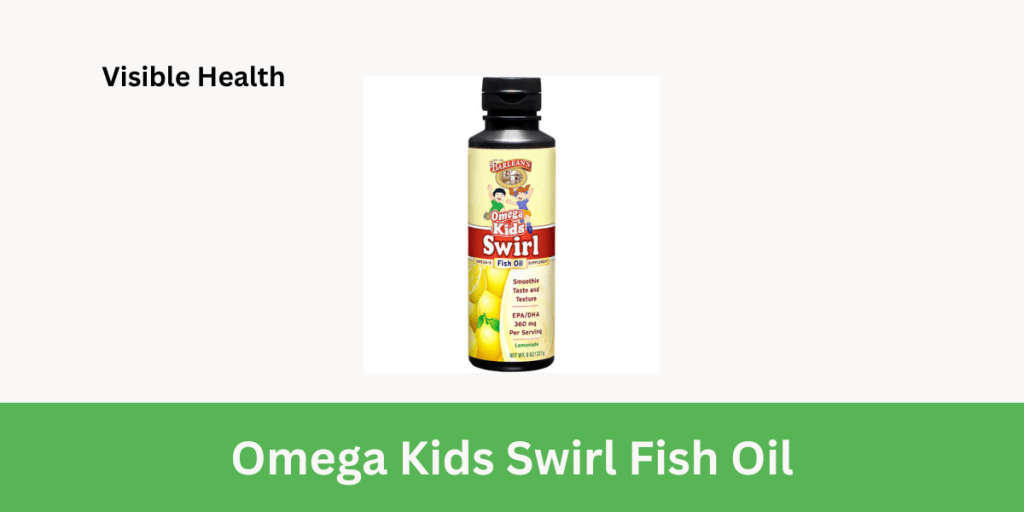
This kid-friendly supplement is designed to provide essential omega-3 fatty acids in a tasty lemonade flavor, making it a great fish oil alternative. The formula includes 540 mg of emulsified Omega-3 EPA and DHA per serving, with no fishy burps, and is naturally sweetened with xylitol.
This supplement supports brain development, cognitive function, and overall health in children.
It can be consumed directly or mixed into smoothies or yogurt for added flavor.
Product reviews highlight its great lemony taste, which kids love.
With a satisfaction guarantee, Barlean’s guarantees you can return the product if not satisfied, making it a reliable choice for incorporating omega-3s into your child’s diet.
2. ChildLife Cod Liver Oil Liquid For Children
ChildLife Cod Liver Oil Liquid stands out as an excellent option for parents seeking a nutritious and palatable fish oil supplement for their children.
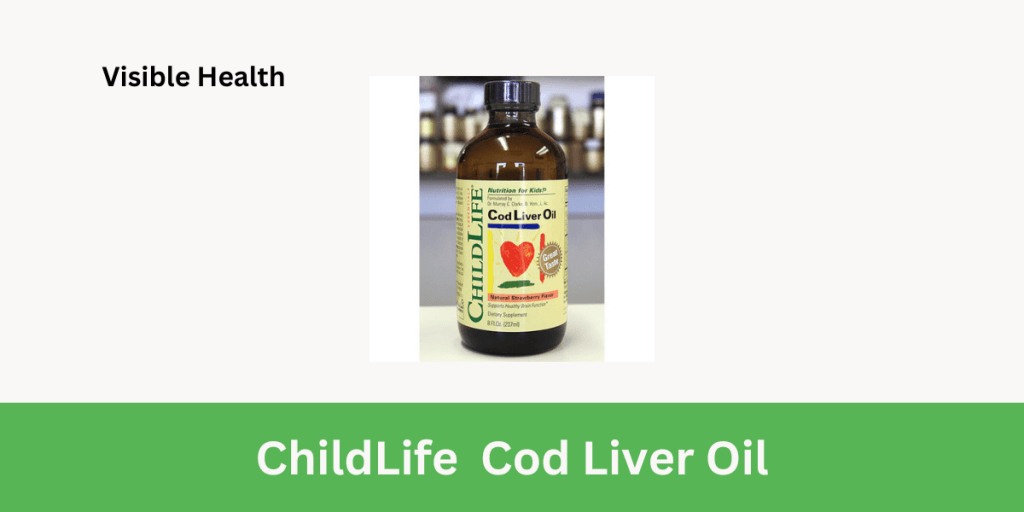
This supplement is rich in omega-3 fatty acids, including DHA and EPA, which are vital for brain development, nervous system function, and eye health.
The cod liver oil benefits include supporting healthy brain growth and function, particularly important during childhood and adolescence.
ChildLife Cod Liver Oil comes in a natural strawberry flavor, making it appealing to kids.
It’s purified using molecular distillation to guarantee it’s free from toxins.
The recommended dosage is 1/2 to 2 teaspoons daily, depending on the child’s age.
This omega-rich supplement provides essential nutrient support for overall child health, making it a valuable addition to a child’s dietary regimen.
3. Oceans Kids DHA Chewables
The Oceans Kids DHA Chewables by Garden of Life are a top choice, offering healthy nutrients essential for child development. These chewables provide 250mg of omega-3 fatty acids, including 120mg of DHA and 80mg of EPA, along with naturally occurring vitamins A and D3.
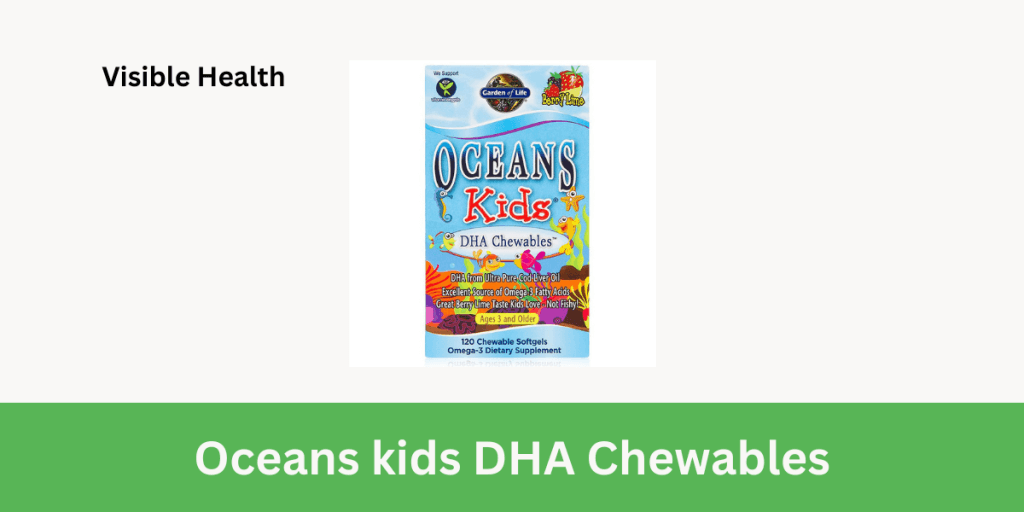
These fish oil benefits support brain function, heart health, and immune function, making them a valuable addition to your child’s diet. The Berry Lime flavor makes them enjoyable for kids, and they’re sugar-free, gluten-free, and dairy-free.
Recommended for children aged 3 and older, these chewables are formulated to be easy to consume and packed with nutrients to promote overall well-being.
4. Nordic Naturals Baby’s DHA Liquid with Vitamin D3
Nordic Naturals Baby’s DHA Liquid is a standout option when seeking a high-quality fish oil supplement for your child with vitamin D3.
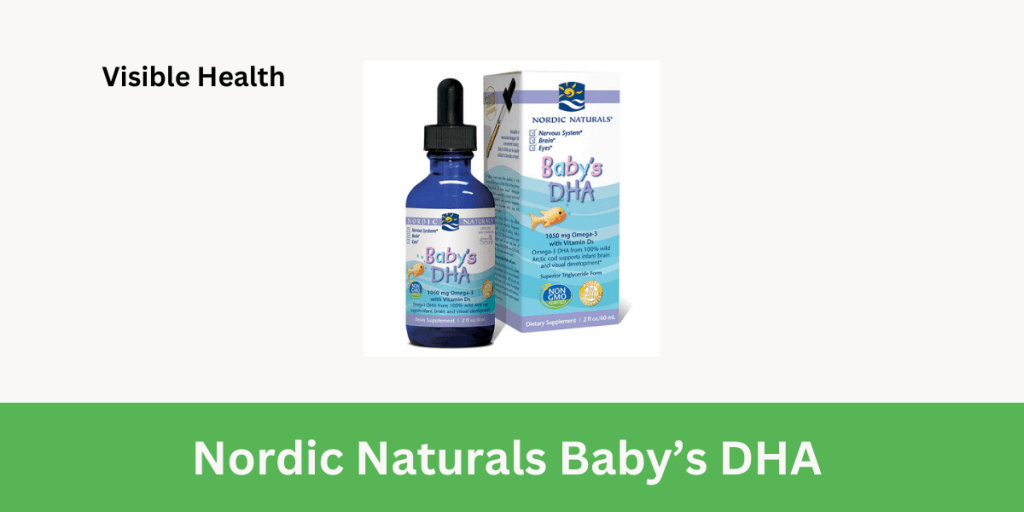
This supplement supports healthy infancy and fresh beginnings by providing essential nutrients for brain development. Made from quality ingredients, including 1050 mg of omega-3s (485 mg of DHA and 350 mg of EPA) and 300 IU of Vitamin D3, it promotes cognitive growth and overall wellness.
Derived from sustainably sourced, 100% wild Arctic cod, this supplement guarantees safe and effective nutrition.
It’s free from heavy metals, toxins, gluten, and milk derivatives, making it a safe choice for infants.
The unflavored formula and easy-to-use dropper make administration convenient.
With third-party testing for purity and freshness, Nordic Naturals Baby’s DHA Liquid is a trusted supplement for supporting your child’s healthy growth.
5. Nordic Omega-3 Fishies for Kids
Nordic Omega-3 Fishies offer a fun and effective way to certify your child gets the essential omega-3 fatty acids they need for healthy development.
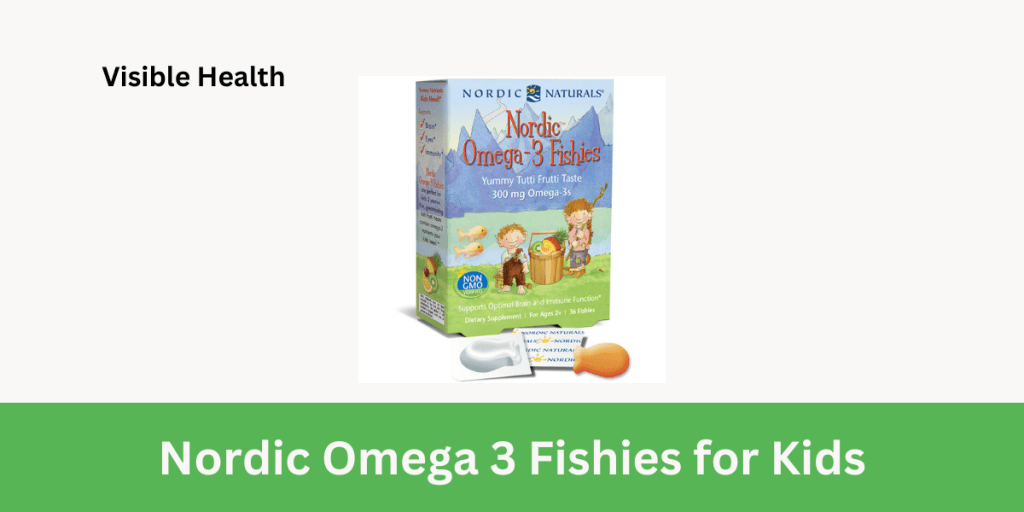
These gummy vitamins from Nordic Naturals are designed for children aged 2 and older, providing 300 mg of total omega-3s per serving, including 150 mg of EPA and 100 mg of DHA.
Made from wild-caught sardines and anchovies, these fish oil supplements support brain development, cardiovascular health, and immune function.
The gummies come in a tasty tutti frutti flavor, free from artificial colors and preservatives.
With a suggested daily intake of two gummies, Nordic Omega-3 Fishies confirm your child benefits from the fish oil benefits without the hassle of fishy supplements.
How Can You Incorporate Fish Oil into Your Child’s Diet?
To incorporate fish oil into your child’s diet, you can use flavor masking techniques to make the supplement more palatable.
For instance, mix the fish oil into foods like smoothies, yogurt, or oatmeal, as suggested by products like BrainMD’s Kids’ Omega-3 Squeeze and Carlson Labs’ Kid’s The Very Finest Fish Oil, which come in flavors such as lemonade, orange, and mixed berry.
Creating a routine for consistency is also vital.
Administer the fish oil at mealtimes to help with absorption and make it a part of your child’s daily schedule. For example, Bare Biology recommends using their Pure Omega-3 Fish Oil at mealtimes, either directly or mixed into cold foods and drinks.
How Can You Use Flavor Masking Techniques?
Incorporating fish oil into your child’s diet can be made easier by using flavor masking techniques, which help disguise the taste and smell of the oil.
To enhance palatability, consider the following methods.
- Fruit infusion: Mix fish oil with fruit juices or smoothies to mask the flavor.
For example, adding it to a berry smoothie or orange juice can make it more appealing. - Creamy emulsions: Combine fish oil with creamy foods like yogurt or oatmeal to create a smoother texture and less noticeable taste.
- Flavor enhancers: Use flavor-enhanced fish oil supplements that come in tasty flavors such as lemon, orange, or mixed berry, which can be more appealing to children.
- Syrupy coatings: Some supplements come in a syrupy form that can be mixed into foods or taken directly, often with a pleasant flavor to boost palatability.
These techniques can substantially improve the acceptance of fish oil supplements among children.
How Can You Create a Routine for Consistency?
Creating a consistent routine for giving your child fish oil supplements is crucial for guaranteeing they receive the full benefits of omega-3s.
Incorporate the supplement into your child’s morning routine, such as right after breakfast, to make it a habitual part of their daily schedule.
Implement consistency checks by setting daily reminders on your phone or placing the supplement bottle in a visible spot.
Use habit tracking tools or apps to monitor and guarantee the supplement is given at the same time every day.
Make routine adjustments as needed, such as mixing the fish oil into smoothies, yogurt, or oatmeal, to keep the process smooth and enjoyable.
What Natural Sources of Omega-3s Exist?
When it comes to natural sources of omega-3s, you can turn to several foods and supplements that are rich in these essential fatty acids.
For a Fish Frenzy, consider fatty fish like mackerel, salmon, and sardines, which are high in DHA and EPA.
These fish are packed with nutrients such as vitamin B12, selenium, and magnesium.
If you prefer plant-based options, Walnut Wonder offers a good source of ALA omega-3s, found in walnuts, flaxseeds, and chia seeds.
These seeds are also rich in fiber, protein, and other essential nutrients.
For those interested in supplements, Barlean’s kids swirl fish oil, Childlife cod liver fish oil, and Oceans Kids DHA Chewables oil are excellent choices.
Algae oil is particularly beneficial for vegetarians and vegans, providing DHA and EPA without the need for animal products.
Affiliate Disclosure: Some of the links in this post are affiliate links, which means I may earn a small commission if you make a purchase through those links. This comes at no extra cost to you. Thank you for your support!

